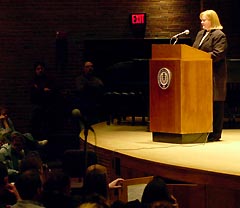|
This is an archived article.
For the latest news, go to the
Advance Homepage
For more archives, go to the Advance Archive/Search Page. | ||
|
Judy Shepard Discusses Gay Son's
Legacy
By Elizabeth Omara-Otunnu Openness and political participation are essential to improving the climate for gays and lesbians, according to Judy Shepard, whose 21-year-old son Matthew was murdered for being gay. She says that in order to lift the "cloak of mystery" that fosters ignorance and bigotry, gays must come out and stay out, and members of society - both gay and straight - must participate in the democratic process to ensure the rights of homosexuals.
Speaking to an attentive, standing-room crowd in von der Mehden Recital Hall Nov. 19, during an event sponsored by the Rainbow Center, the soft-spoken Shepard recounted how experiencing "a mother's worst nightmare" thrust her into the national limelight. She recalled the night of October 8, 1998, when she and her husband, who were living in Saudi Arabia at the time, received a call from a Colorado hospital. Their son had been picked up by two men from a bar, driven to a deserted place, robbed, tortured, tied to a fence, and left for dead. She described the agonizing journey back to the United States. When the Shepards arrived at the hospital, they could barely recognize their son because he had been so badly beaten. "Such an act of cruelty is incomprehensible," she said. "All our hopes for Matt were lost for $20 and some twisted reason known only to the killers." In her grief, Shepard said, she vowed "to make something positive come from something so completely devoid of humanity." She has become an advocate for changes in public policy toward gays and lesbians. "I lost my son to hate," she said. "My goal is now to rid the world of hate." Shepard noted that individuals can make a difference. "One of the most important things you can do is to vote," she told the mostly student audience. "If you didn't vote in the recent election, shame on you." She said all citizens have the responsibility to communicate with their elected representatives. "If you disagree with them or want to promote an issue, let them know - because silence implies approval." On the issue of hate-crime legislation, for example, "you must let them know where you stand and what you think," she said. "If you don't participate, you can't complain." Shepard said the media tend to focus on "the more exotic members" of the gay community and the public knows little about the majority of gays, who are, she said, "just like everybody else. The only difference is their sexuality, which makes up a tiny portion of who a person is." Shepard outlined some of the problems faced by gays and lesbians, such as being fired from a job, excluded from housing, barred from marrying a same-sex partner, or restricted in the ability to adopt a child. "Isn't it better for kids to be in families that love them?" she asked. "Families are no longer a mom and a dad, 2.5 kids, and half a dog. Families are a collection of people who love and respect one another." To address widespread ignorance, gays must be open about their identity, she said: "You all have to come out and stay out, all day, every day. It's the only way to make the rest of the country familiar with who you are." She said she recognizes that there may be practical obstacles to announcing that one is gay: "If you're a college student and someone is paying your tuition, you may want to wait. But it doesn't get any easier the longer you wait." Shepard said if she had not known about her son's homosexuality before he was killed, she would have been even more devastated. "If you all don't come out, who will, and when?" she asked. "Will the same issues exist 20 years from now? I hope not." Shepard said that, unfortunately, many gay young people are shunned by their families because of their sexual orientation and end up on the streets. She questioned how parents could reject their children when they come out: "Does this mean they don't love their children now, when five minutes earlier they loved them?" She said gays should be truthful with co-workers about their lives and admit that the picture on their desk is of a partner, not a "cousin". Sexual orientation "is not a matter of choice," she said. "This is who you are." Shepard noted that people can choose not to hate, because hate is a learned behavior: "If we learn hate, we can unlearn it. We just need to make the choice to do so." |

